The president of Yemen, home to an eight-year-old civil war and arguably the world’s worst humanitarian crisis, told the United Nations General Assembly on Thursday that as many as 20 million people in his country are facing famine.
Rashad Mohammed Al-Alimi, who took over from former President Abdrabbuh Mansur Hadi in April, denounced the violent Islamist regime in Iran for supporting the Shiite Houthi militias that began the war by invading the nation’s capital, Sanaa, in 2014 and “interfering in our domestic affairs in an absolutely unacceptable way.” He urged the United Nations to respect the global sanctions on Iran’s economy and add to them to prevent funding from Tehran to go towards weapons for the Houthis.
The Houthi attack in 2014 resulted in the group — a jihadist terrorist group whose motto is “Allahu akbar, death to the United States, death to Israel, a curse on the Jews, victory for Islam” — taking over Sanaa and forcing the legitimate, Sunni-led government to relocate to Aden.
The Yemeni government has relied on aid primarily from Saudi Arabia to continue fighting the war, but the Houthis have largely succeeded in blockading areas they control. Having conquered the critical western port city of Hodeidah, the Houthis have repeatedly blocked agencies such as the United Nations from shipping critical food and medical aid to the country. Some reports have also blamed the Saudi-led coalition for conducting attacks that impede the delivery of humanitarian aid.
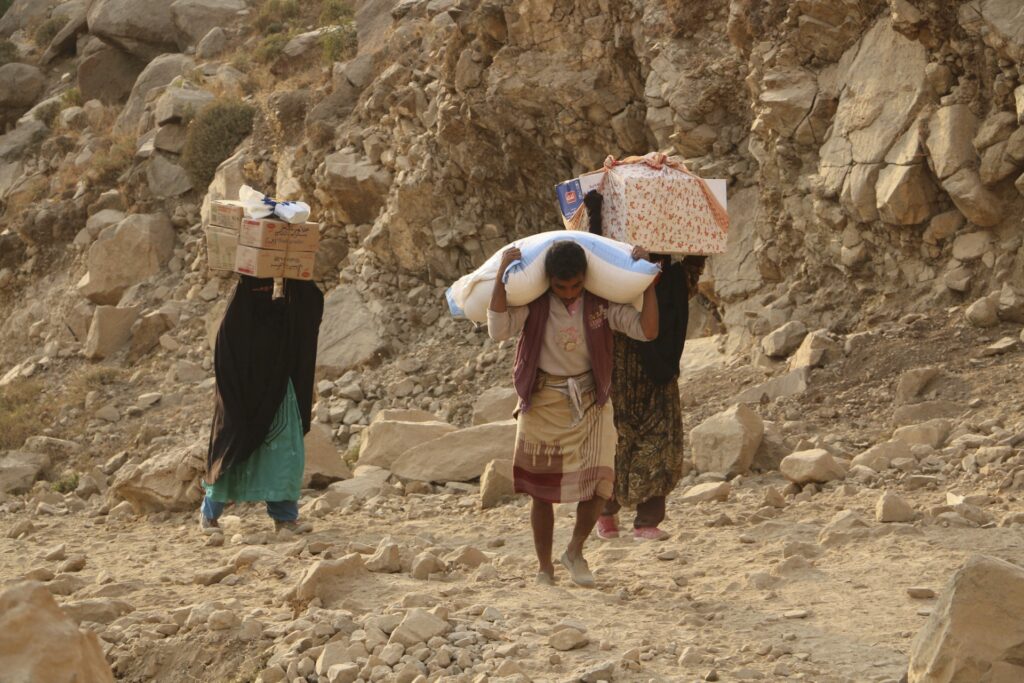
Yemenis carry relief supplies as they walk along a path after Shiite rebels, known as Houthis, besiege the city of Taiz, Yemen, Jan. 17, 2016. (AP Photo/Abdulnasser Alseddik)
The Houthis also face mounting accusations of human rights atrocities against Yemeni civilians, among them the prolific abduction of children to be used as soldiers in the war. The United Nations confirmed as recently as June that Houthi terrorists are still using child soldiers in battle, despite having made several promises during the course of peace talks to cease the practice.
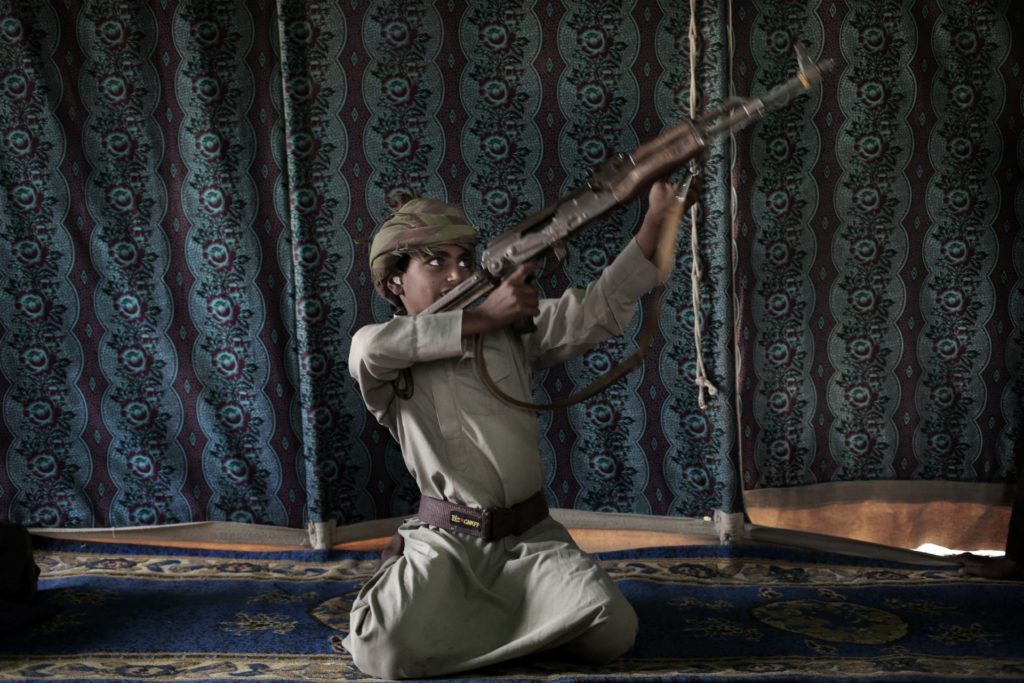
In this July 27, 2018, file photo, Kahlan, a 12-year-old former child soldier with Yemen’s Houthi rebels, demonstrates how to use a weapon at a camp for displaced persons where he took shelter with his family in Marib, Yemen. (AP Photo/Nariman El-Mofty)
As one of his first acts in office, President Joe Biden removed the Houthi organization from America’s list of Foreign Terrorist Organizations. He has refused to re-list the jihadists despite overwhelming evidence that they continue to engage in acts of terrorism.
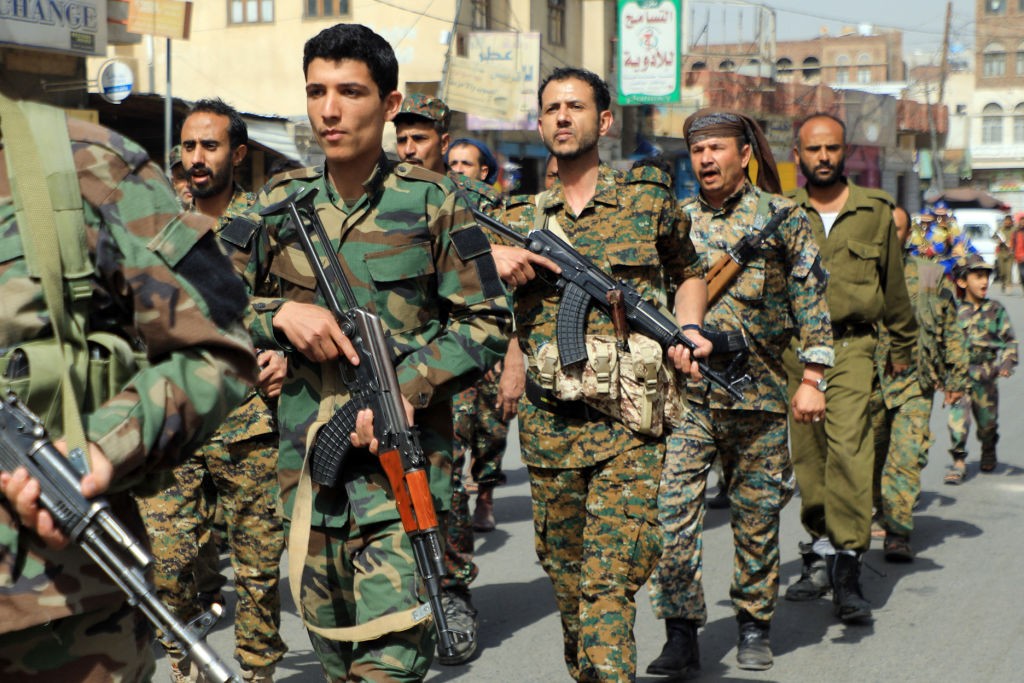
Forces loyal to Yemen’s Huthi rebels take part in a military parade in the capital Sanaa, on March 29, 2022. (MOHAMMED HUWAIS/AFP via Getty Images)
Al-Alimi lamented during his remarks on Thursday that Yemen has endured eight years of war with diplomatic success in the quest to limit hostilities.
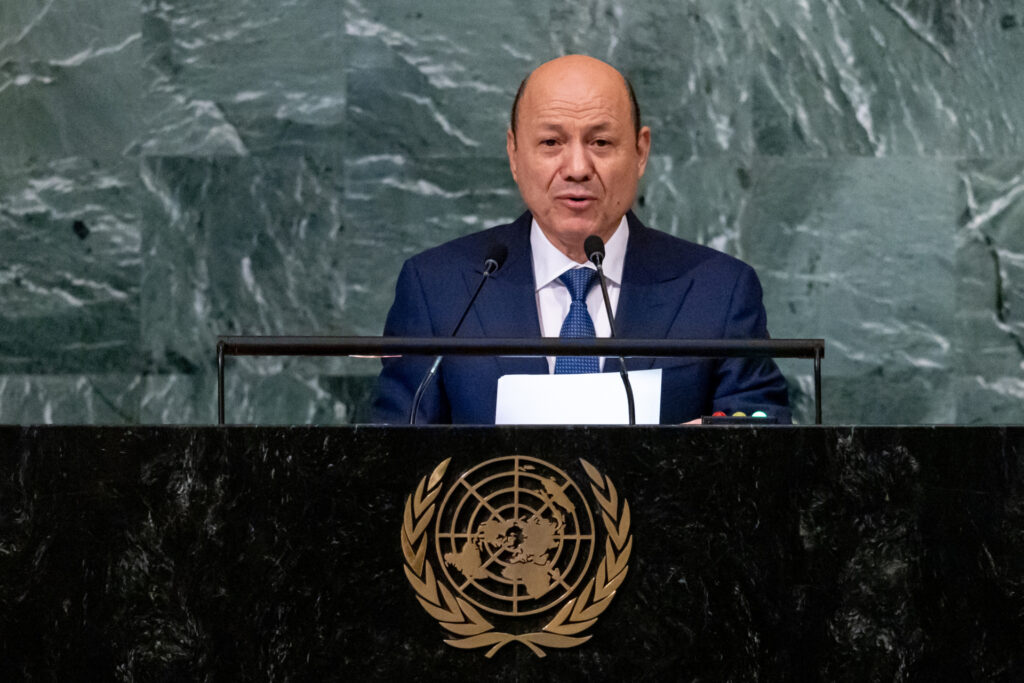
President of Yemen Rashad Mohammed al-Alimi addresses the 77th session of the United Nations General Assembly, Thursday, Sept. 22, 2022 at U.N. headquarters. (AP Photo/Julia Nikhinson)
“For the eighth year in a row, a Yemeni leader is telling you about the destruction humanitarian crisis which is the worst in the world in Yemen,” the head of the nation’s presidential council said. “Each time that a year passes without a robust position being taken on Yemen, losses pile up, militias and terrorist groups become increasingly dangerous, and are a real translational threat.”
Al-Amini emphasized the dangers to neighboring countries and the potential for an explosive migrant crisis around the world.
“This is the real threat to stability in our region, a threat to international navigation routes, to energy supplies – all of this led to hundreds of thousands of lives lost, to people being injured, to a situation where 20 million people are currently suffering from famine,” he said. “There are hundreds of thousands of refugees … 4 million internally displaced persons within Yemen itself.”
Amini also warned of potential oil tanker sabotage – exacerbating already high global oil prices and potentially causing significant environmental damage.
Houthi terrorists have this year increased their attacks on foreign oil facilities, particularly in Saudi Arabia. In March, a Houthi attack targeted an oil storage facility in Jeddah, Saudi Arabia, unleashing a massive fireball over the city. Following the bombing and similar attacks, Saudi officials began warning that their oil supply could soon be significantly impacted by the destruction caused by the Houthis within Saudi borders. Saudi officials warned they could not be held responsible for any increase in gasoline prices or oil shortages the attacks may cause.
At the United Nations, Amini appeared to accuse the organization itself of hesitating in the use of force to subdue a terrorist threat and warned that such hesitation would escalate the hostilities, not end them.
“If we continue to fear the use of force against terrorism, well, that will lead to a humanitarian disaster,” Amini warned. “In truth, we need to find alternative solutions, deterrents indeed. The international community needs to support the legitimate government to ensure the values of peace and peaceful coexistence prevail.”
Amini’s only concrete suggesting for an alternative solution was further sanctioning Iran, the main patron of the Houthi movement and the world’s premiere state sponsor of terrorism.
“Today, Iran is interfering in our domestic affairs in an absolutely unacceptable way. That is why sanctions against that country need to be respected in line with the law and international agreements,” the president said, adding the world must “reach agreement on nuclear nonproliferation and … ensure that no military aid be given to Iran, in particular through the provision of drones that are currently being used in terrorist acts against citizens of my country and other countries in the region.”
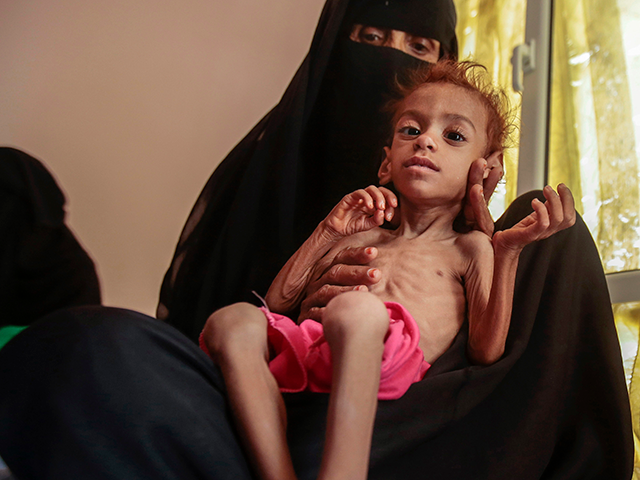
COMMENTS
Please let us know if you're having issues with commenting.